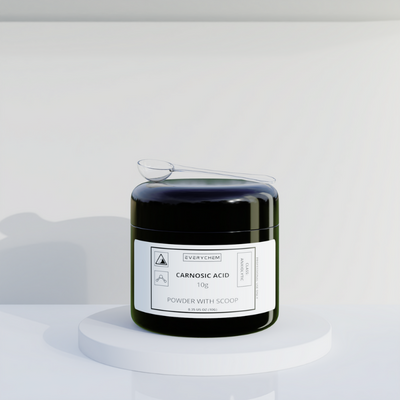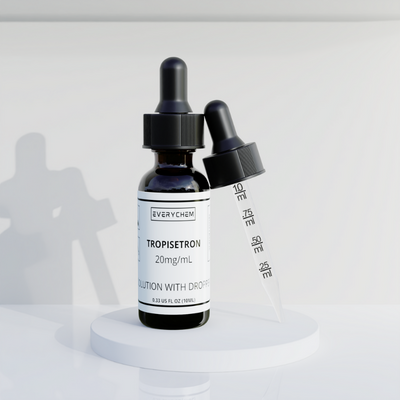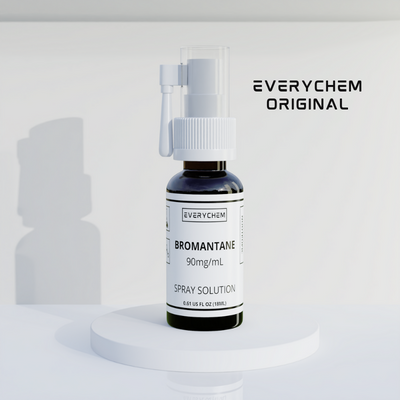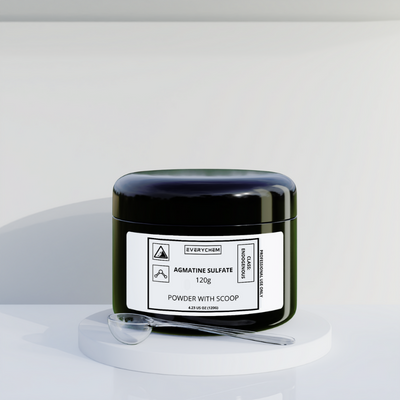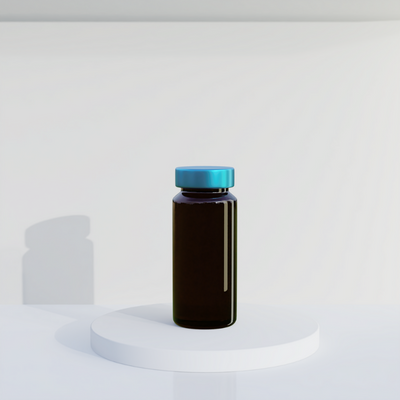Buy Carnosic Acid | Anxiolytic antioxidant | Read more:
Background
Carnosic acid is a common constituent of dietary herbs such as rosemary, however this is an extraction of near complete purity (95%). In some parts of the world, such as China, Carnosic acid is used as a food preservative due to being one of the strongest antioxidants found in nature. It has been shown to preserve fatty acids better than some synthetic antioxidants in studies, suggesting a potent contact antioxidant effect [2]. This correlates with the benefits of rosemary extract to balding when used as a topical treatment [3].
That being said, Carnosic acid has been investigated due to its ability to produce an anxiolytic effect in preclinical trials, by reducing noradrenaline and increasing serotonin [1]. In this study, it reached similar significance in this ability as a synthetic benzodiazepine. That is a surprising finding, for a compound that has no effect on GABA or GABA receptors.
Carnosic acid has also been studied for its beneficial effects in preclinical models of post-traumatic brain injury (TBI) [4], reversing superbug antibiotic resistance (despite having no antibiotic effect on its own) [5], and improving a variety of cognitive impairments from long COVID-19, Alzheimer’s and Parkinson’s [6] in rodents. There are other studies as well, such as in C. Elegans where carnosic acid extended lifespan [7], or other rodent studies where carnosic acid produced anti-diabetic effects such as reducing insulin resistance caused by fatty acids [8], prevented heavy metal toxicity from Cadmium [9]
Pharmacology
References
[1] Carnosic Acid anxiolytic effect in rodents: https://www.semanticscholar.org/paper/Key-Role-of-Carnosic-Acid-in-the-Anxiolytic-like-of-Kumar-Agarwal/a5bdfeeb3f9de7617d8216b2f3c5e469425d817a
[2] Carnosic Acid’s preservative effect compared to other antioxidants: https://www.ncbi.nlm.nih.gov/pmc/articles/PMC5884750/
[3] Rosemary’s effect on balding: https://pubmed.ncbi.nlm.nih.gov/25842469/
[4] Carnosic Acid improves post-TBI cognition in rodents: https://www.ncbi.nlm.nih.gov/pmc/articles/PMC6602106/
[5] Carnosic Acid reverses antibiotic resistance in rodents: https://www.frontiersin.org/articles/10.3389/fphar.2020.581001/full
[6] Carnosic Acid improves long COVID, Alzheimer’s and Parkinson’s in rodents: https://www.ncbi.nlm.nih.gov/pmc/articles/PMC8772720/
[7] Carnosic Acid’s effect on lifespan in C. Elegans: https://pubmed.ncbi.nlm.nih.gov/30758000/
[8] Carnosic Acid reduces insulin resistance in rodents: https://www.mdpi.com/2073-4409/11/1/167
[9] Carnosic Acid reverses Cadmium-induced damage in rodents: https://www.ncbi.nlm.nih.gov/pmc/articles/PMC6891359/
[10] Carnosic Acid
Disclaimer
Scientific discussion is purely for educational purposes. This is not medical advice.

